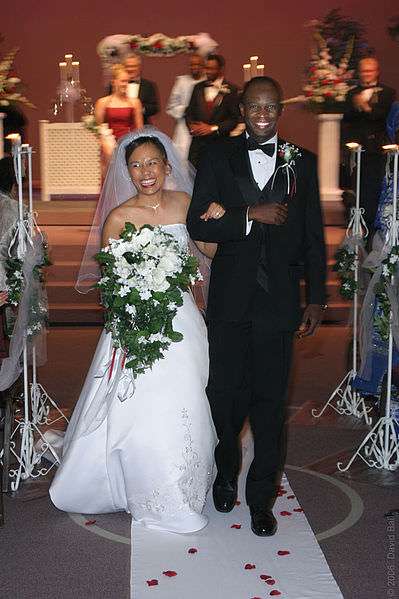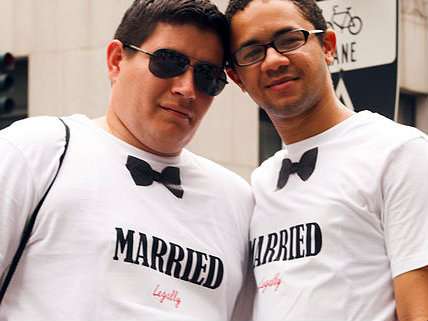Marriage: It's Complicated
Let people love, in ways old and new.

It's wedding season! More Americans get married in June than in other months. Why June? The timing seems pretty arbitrary if you look up its history.
Some claim it's because June was named after Juno, the Roman goddess of marriage. Others say it's because in the 1500s, people took their annual bath in May, which meant they probably smelled best around this time of year. (Be thankful for modern times.) A third and more plausible explanation: If a bride got pregnant in June, she wouldn't be too big during summer to help with growing and harvesting food.
Whatever the reason for choosing June, marriage is an ancient custom, and its core function of giving kids a stable home remains very important. Most kids do better if their parents are married, so it's not a good thing that fewer American parents marry these days.
On my show, Manhattan Institute scholar Kay Hymowitz said divorce and remarriage don't help kids much either. She noted, "One thing we see, particularly with boys," is that after a divorce, even if there is a new father figure in the picture, "children are more likely to have trouble in school, more likely to have behavioral problems."
Because of such data, politicians rush in with your money to "help" people stay married. But does government help? Probably not.
Every year, government gives the group Family Expectations $100 million to teach couples how to have "healthy relationships." Family Expectations gives parents "crib cash" if they follow certain rules and advice.

Does this preserve marriage? No. The government's own study found that couples who attended Family Expectations workshops were no more likely to stay together.
So did politicians stop the funding? Of course not. They're politicians—they never stop throwing your money away. This year they gave Family Expectations another $100 million.
Republicans in Oklahoma may have stumbled onto a better idea regarding government's role in marriage. They were angry after a judge ruled their state must recognize gay marriages—so they proposed that the state stop recognizing any marriages.
They may have been throwing a tantrum, but getting government out of the mix would put an end to many stupid fights.
If private individuals are free to make whatever marriage contracts and observe whatever marriage customs they like, that leaves everyone else free to ignore those couples if they don't approve. Arrangements that work best will tend to endure.
And despite the data showing that children do better if their parents are married, we shouldn't assume we know what works best. Even as marriage rates have decreased and divorce increased, youth violence dropped and high school graduation rates went up.
There was a lot of worry about teen pregnancy 20 years ago. Despite the decrease in marriage, the rate of teen pregnancy fell 43 percent from 1991 to 2008. The number of arrests for violence among teens is half of what it was when it peaked in the '90s.
Society changes, and those changes aren't all bad. It's often foolish to predict what effects those changes will have.
Here's one final, happy thought: As American media hype racial conflict in America, we should celebrate the good news that intermarriage between ethnic groups continues to increase.
When I was 11, it was illegal in many states for an interracial couple to marry. One couple, appropriately named "Loving," was sentenced to jail for violating Virginia's Racial Integrity Act. The Lovings—he was white and she was black—fought the sentence until the Supreme Court declared it unconstitutional. Since then, marriage between people from different races has steadily increased—it's up 28 percent since the last census. There are even dating websites that specialize in "mixed" relationships.
This is a good thing. Let people love, in ways old and new, even if we make mistakes along the way. Be very suspicious if government says it's bringing the perfect gift to the wedding.


Show Comments (152)